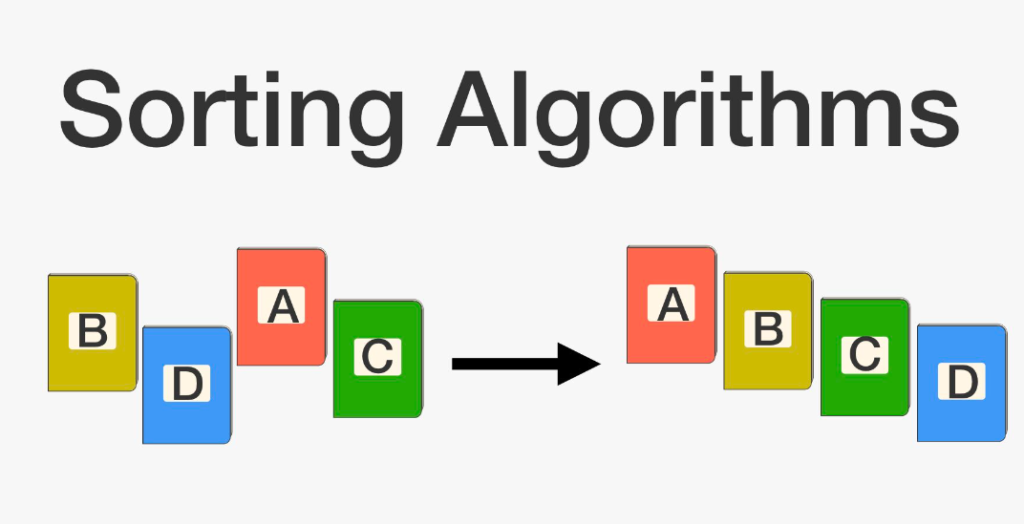three different sorting algorithms: Merge Sort, Heap Sort, and Radix Sort. These algorithms are each explained briefly, and the code is provided for each one
Sorting Algorithms
Table of Contents
Merge Sort:
- Merge Sort is a divide-and-conquer algorithm that divides the input array into two halves, recursively sorts them, and then merges the sorted halves.
- Time Complexity: O(n log n)
- Space Complexity: O(n)
import java.util.Arrays;
public class MergeSort {
public static void mergeSort(int[] arr) {
if (arr.length > 1) {
int mid = arr.length / 2;
int[] left = Arrays.copyOfRange(arr, 0, mid);
int[] right = Arrays.copyOfRange(arr, mid, arr.length);
mergeSort(left);
mergeSort(right);
int i = 0, j = 0, k = 0;
while (i < left.length && j < right.length) {
if (left[i] < right[j]) {
arr[k++] = left[i++];
} else {
arr[k++] = right[j++];
}
}
while (i < left.length) {
arr[k++] = left[i++];
}
while (j < right.length) {
arr[k++] = right[j++];
}
}
}
public static void main(String[] args) {
int[] arr = {12, 11, 13, 5, 6, 7};
System.out.println("Original array: " + Arrays.toString(arr));
mergeSort(arr);
System.out.println("Sorted array: " + Arrays.toString(arr));
}
}
Heap Sort:
- Heap Sort is based on the binary heap data structure. It builds a max-heap and repeatedly extracts the maximum element from it.
- Time Complexity: O(n log n)
- Space Complexity: O(1)
import java.util.Arrays;
public class HeapSort {
public static void heapSort(int[] arr) {
int n = arr.length;
// Build a max heap
for (int i = n / 2 - 1; i >= 0; i--) {
heapify(arr, n, i);
}
// Extract elements from the heap one by one
for (int i = n - 1; i >= 0; i--) {
int temp = arr[0];
arr[0] = arr[i];
arr[i] = temp;
heapify(arr, i, 0);
}
}
public static void heapify(int[] arr, int n, int i) {
int largest = i;
int left = 2 * i + 1;
int right = 2 * i + 2;
if (left < n && arr[left] > arr[largest]) {
largest = left;
}
if (right < n && arr[right] > arr[largest]) {
largest = right;
}
if (largest != i) {
int swap = arr[i];
arr[i] = arr[largest];
arr[largest] = swap;
heapify(arr, n, largest);
}
}
public static void main(String[] args) {
int[] arr = {12, 11, 13, 5, 6, 7};
System.out.println("Original array: " + Arrays.toString(arr));
heapSort(arr);
System.out.println("Sorted array: " + Arrays.toString(arr));
}
}Radix Sort:
- Radix Sort is a non-comparative sorting algorithm that sorts integers by processing individual digits. It can be applied to integers or strings with a fixed length.
- Time Complexity: O(n * k)
- Space Complexity: O(n + k)
import java.util.Arrays;
public class RadixSort {
public static void radixSort(int[] arr) {
int max = Arrays.stream(arr).max().getAsInt();
for (int exp = 1; max / exp > 0; exp *= 10) {
countingSort(arr, exp);
}
}
public static void countingSort(int[] arr, int exp) {
int n = arr.length;
int[] output = new int[n];
int[] count = new int[10];
Arrays.fill(count, 0);
for (int i = 0; i < n; i++) {
count[(arr[i] / exp) % 10]++;
}
for (int i = 1; i < 10; i++) {
count[i] += count[i - 1];
}
for (int i = n - 1; i >= 0; i--) {
output[count[(arr[i] / exp) % 10] - 1] = arr[i];
count[(arr[i] / exp) % 10]--;
}
System.arraycopy(output, 0, arr, 0, n);
}
public static void main(String[] args) {
int[] arr = {170, 45, 75, 90, 802, 24, 2, 66};
System.out.println("Original array: " + Arrays.toString(arr));
radixSort(arr);
System.out.println("Sorted array: " + Arrays.toString(arr));
}
}You can run each of these sorting algorithms independently to see how they work on different input arrays.

- Top 10 Internship Finder Project Ideas for Final Year Students in 2026
- Instagram Bot Using Python (Automation Project)
- Chatbot Project in Python
- Top 10 AI Agent Project Ideas for Final Year Students in 2026
- AI-Based Visitor Analytics and Behavior Tracking
https://updategadh.com/chatcpt/create-a-chatbot-with-openai-chatgpt/
Java Projects Video :Click here
https://updategadh.com/php-project-demo-vedios
https://updategadh.com/java-projects-demo-video
🎓 Need Complete Final Year Project?
Get Source Code + Report + PPT + Viva Questions (Instant Access)
🛒 Visit UpdateGadh Store →
Post Views: 1,255
